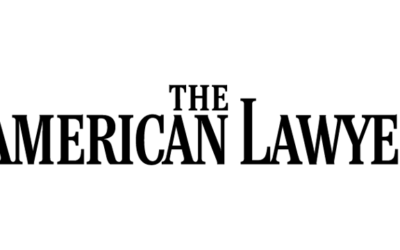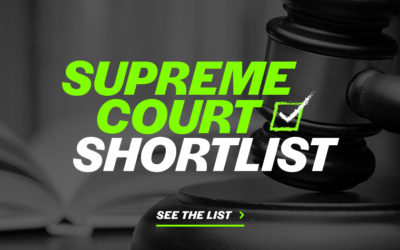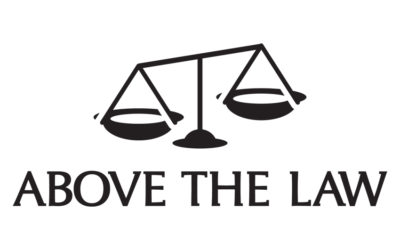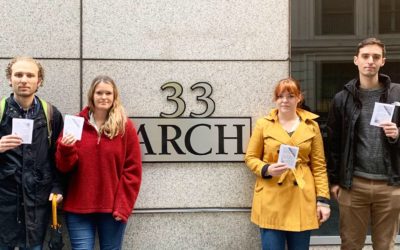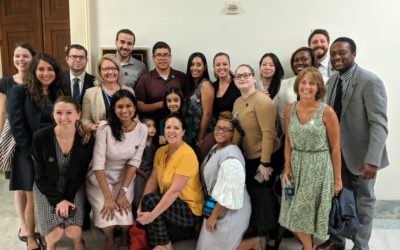OUR APPROACH
After a half century of work, the conservative legal project has paid off: our legal system almost exclusively serves corporate power and the interests of the far-right. At every turn, the legal system seems to thwart the collective power of everyday people.
We know that the legal profession is at the root of the problem, and thus it must also be at the core of the solution.
At PPP, we aim to make clear that the practice of law is inherently political. When you enter the profession you choose a side. You can be on the side of the pro-corporate forces fighting against progress, or you can be on the side of the people.
We equip our organizers to choose the side of the people, and develop and execute campaigns to build a better legal system. Our organizers support the nominations of pro-people state court judges; hold lawyers accountable for deploying coercive contracts in service of corporate power; work to open the courthouse doors to working people; campaign to ease the financial barriers for students who pursue pro-people legal careers; and more.
By successfully engaging organizers in these campaigns, we achieve three things:
1.) There are meaningful and immediate changes made to how the legal system works.
2.) The relationships formed through this work empower organizers to question the dominant norms of the legal academy and profession and stay on a pro-people career path.
3.) Organizers learn to see their role as lawyers as part of a larger fight for justice. They understand how to effectively use their legal knowledge and skills in solidarity with and in service of the broader community.
In this way, we are doing the long-term organizing work needed to achieve our ultimate goal: a legal system that works for working people, not corporate America.
ready to unf*ck the law?
Doing the work of unrigging our legal system is going to take a true movement for change within the legal profession. Are you ready to be part of it?
OUR PRIORITIES
WORKER POWER
When pro-corporate forces run our legal system, working people are left to pay the price. Because the consequences of our rigged legal system fall most heavily on working people, our we center worker power as a core tenant of our efforts.
PPP has been fighting coercive contract terms, like forced arbitration clauses and non-compete “agreements” since our founding. Our campaigns have led to thousands of workers being freed from forced arbitration clauses, helped build momentum for passage of the Forced Arbitration Injustice Repeal Act, and raised awareness about the role lawyers play in using the fine print of contracts to harm workers and consumers.
Through our chapters, we’re building communities that fight the corporate capture of the legal profession. Too often, law students and young attorneys are told that regardless of their values, Big Law is the best place to start their career. By exposing law students to economic justice lawyers, particularly in the plaintiffs’ bar, supporting campaigns to make this work more accessible (e.g., improving loan forgiveness options and creating more accessible information about pro-worker and pro-consumer lawyering), and raising awareness about the harm caused by corporate lawyers, we’re ensuring that law students who enter law school wanting to fight for economic justice leave doing that work.
FEDERAL JUDGES
We work to ensure that as many pro-people lawyers become judges as possible. This began with changing the public conversation, setting the standard for what a progressive judicial nominee looks like.
We’re proud to have worked with and supported multiple fantastic lawyers who have successfully been nominated and confirmed to the federal bench.
We’re equally proud to continue to hold the Biden administration accountable for putting pro-people judges on the bench, advocating for more pro-people judges at every turn.
As we work to ensure there are more pro-people judges on the bench, we are changing what justice looks like in the short term. Equally importantly, we are changing the culture of the legal profession to one in which law students and young attorneys recognize that a career in public interest will open—not close—doors.
STATE COURTS
The vast majority of individuals who interact with the legal system will do so through the state court system. And for as long as the federal judiciary remains in the control of far-right reactionaries with too much power, state courts will seem to be a more viable path for litigation that advances the rights of the American people.
However, without adequate democratic engagement, these courts are also at risk of experiencing a crisis of legitimacy and being fully captured by the same forces that have taken control of the federal courts. We recognize that we must increase the public’s oversight of these courts, in order to ensure that state judiciaries are accountable to the people.
At PPP, we’re taking a four-pronged approach to building this democratic engagement with state courts nationwide:
1. Raising awareness about what state courts are, what they’re doing, and why it matters.
2. Building a pipeline of pro-people law students and lawyers who see service on the bench as a plausible path for a to pursue, and who have the training, network, and other support necessary to do so.
3. Supporting on-the-ground campaigns for judicial accountability. We work with our organizers and other allies to hold accountable pro-corporate and pro-carceral judges and judicial candidates, and to build community-led movements to push for a better vision of justice.
4. Working with the Center for Community Alternatives, we’ve built the State Courts Organizing Network, which unites grassroots organizations and activists nationwide to influence judicial selection and shift judicial decision-making at the local level. Through this network, we’re building a community of grassroots leaders who can share best practices and resources, learn from one another, and collaborate to build stronger state courts across the country.
FEDERAL COURT REFORM
The federal judiciary, led by the Supreme Court, is the most significant barrier to progress that we face. Regardless of how much is achieved by Congress and the President, the Supreme Court stands to strike it down, narrow it, or otherwise prevent the American people from reaping the benefits their elected officials won.
In the short-term, there are key things that can be done to ameliorate this risk. This includes nominating and confirming pro-people judges and expanding the size of the Supreme Court in order to restore balance after years of illegitimate power grabs by the far right.
However, this alone is not enough. The Supreme Court is a fundamentally reactionary institution. It lacks democratic legitimacy, and its record makes clear the consequences of concentrating immense power in the hands of unelected, unaccountable elites. We’re fighting to wrestle back power from the federal judiciary—principally the Supreme Court—and put it in the hands of democratically accountable actors, where it belongs.
To do this, we’re taking on three key roles in the effort to disempower the courts:
1. Bringing people together to build workable strategies to disempower the justiciary, prioritizing those that have the potential to have popular support amongst both leaders and the grassroots.
2. Playing a critical thought leadership role, ensuring that the power of the courts—the power it has now, and the questions as to what power it should have in the future—is at the center of every conversation about the progressive project.
3. Building a movement, in partnership with allies and our organizing base, to fight for concrete power-shifting reforms that put power back in the hands of the branches of government with true democratic legitimacy.
Through this work, we aim to alleviate harm in the short term while working with progressive allies and people around the country so that we don’t find ourselves confronting a rogue, anti-democracy court every few decades.
The latest
DLA Piper Dumps Partner After PPP’s Protest—But Will They Dump Forced Arbitration Next?
The day after our tri-city protest against DLA Piper's continued use of forced arbitration, the firm decided to "part ways" with a partner accused of sexual assault. Another former DLA Piper lawyer came forward the same day with her own account of "the culture of...
The American Lawyer: DLA Piper Clings To Mandatory Arbitration—But Not Louis Lehot—As Students Show Clout
Dan Packel writes for The American Lawyer on Law.com: (PHOTO) Law students with the People’s Parity Project distribute leaflets outside of DLA Piper’s Washington office on Thursday, Oct. 10, 2019. It took just nine days for DLA Piper to part ways with Louis Lehot...
PPP Loves to See a Progressive Vision for the Supreme Court
We are thrilled to see Demand Justice putting forth an affirmative, progressive vision of what the Supreme Court could look like. As this list shows, the legal profession is filled with diverse leaders who have built their careers fighting for justice for workers,...
Global Legal Post: DLA Piper under fire
Dr David Cowan writes for the Global Legal Post: The allegations by Ms Guerrero has spurred law students into action, mounting a protest against DLA Piper’s use of mandatory arbitration agreements, which they say allows employers to hide misconduct like sexual assault...
ATL: Law School Students Protest Outside Of DLA Piper Over Alleged Sexual Assault
Kathryn Rubino writes for Above the Law: The heat is getting turned up on DLA Piper. When partner Vanina Guerrero wrote an open letter to the leaders of the firm accusing a fellow partner, Louis Lehot, of sexual assault, she also asked the firm to release her from the...
Future Lawyers Take to the Streets to Protest Forced Arbitration of Sexual Assault at DLA Piper
Law students protesting outside DLA Piper's Boston office today. Boston, MA — On Thursday, October 10, law students in three cities took to the streets to tell DLA Piper to stop subjecting its employees to forced arbitration. The firm continues to use these coercive...
Law Students and Activists Rally to Restore Integrity to the Supreme Court
People’s Parity Project organizers mark the one-year anniversary of Brett Kavanaugh’s confirmation by calling for his impeachment. Washington, D.C. -- The People’s Parity Project joined Demand Justice, the Center for Popular Democracy, the Women’s March, Congresswoman...
Forced Arbitration Injustice Repeal Act Passes the House
Law student organizers and advocates applaud Congress while turning attention to the Senate. CAMBRIDGE, MA -- 20 SEPTEMBER 2019 -- Following months of advocacy by workers, organizers, and law students, the House of Representatives has made history and passed the...
Law.com: Another Law Firm Abandons Mandatory Arbitration as Pressure Continues
Samantha Stokes writes for Law.com: Selendy & Gay is the latest law firm to stop requiring attorneys to sign mandatory arbitration agreements as a condition of employment, building on a campaign to end the practice that emerged in the wake of the #MeToo movement....
Following Nationwide Trend, Selendy & Gay Is the Latest Law Firm to Drop Forced Arbitration
Following a trend among law firms nationwide, New York law firm Selendy & Gay has revised its employment policies and will no longer require its lawyers or any of its employees to sign forced arbitration clauses. Selendy & Gay, a litigation boutique founded by...

